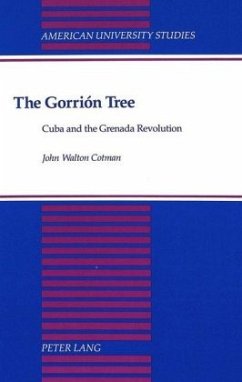Cuba's alliance with the Grenada Revolution of 1979-1983, led by Maurice Bishop, is the centerpiece of this pioneering and provocative analysis of Cuban internationalism. Based on thousands of pages of confidential Cuban and Grenadian government documents and eleven months of field work in Grenada, the work provides the first in-depth look at the lives of Havana's overseas aid workers. It details the social, economic and political impacts of Cuban civilian and military aid programs upon Grenada. New light is shed on Cuba's role in the October 1983 collapse of the Bishop regime and subsequent United States invasion of the Spice Isle.
"This book dispels many myths about how and why Cuba, itself an aid dependent country, has provided aid to other Third World countries in need. He does so on the basis of an in-depth case study of Grenada. Making use of previously unavailable documents and interviews with key informants, Cotman details the nature of Cuban aid and its impact. The aid program is shown to be very different than portrayed by Washington". (Susan Eckstein, Boston University)
"John Cotman has written a lively, interesting and important account of the relationship between Cuba and the Grenada Revolution. The work is a useful addition to the literature on Cuban policy toward Third World revolutionary regimes with special reference to the Caribbean. Cotman writes with conviction and integrates a vast amount of original material into his analysis. This is a major strength of the work that sets it apart from many of the accounts available on the subject. Cuban and Caribbean specialists should find it useful." (Hilbourne A. Watson, Howard University)
"...for both information and insights, I recommend this work to students of Third World revolutions, revolutionary state consolidation and social movements." (Eloise Linger, 21st Century Policy Review)
"The well-documented and clearly written work is useful in chronicling Cuba's relations with Grenada and in contributing to an understanding of the workings and capabilities of Cuban foreign policy. It also provides insights into Grenada's underdevelopment and the politics of the period." (R.L. Delorme, Choice)
"The appearance of øt!his examination of the genuine reality of the relationship between Grenada and Cuba during and immediately after the Bishop revolution is firmly to be applauded." (Hugh O'Shaughnessy, Journal of Latin American Studies)
"'The Gorrion Tree'...is the result of a first-rate research project." (Eloise Linger, 21st Century Policy Review)
"John Cotman has written a lively, interesting and important account of the relationship between Cuba and the Grenada Revolution. The work is a useful addition to the literature on Cuban policy toward Third World revolutionary regimes with special reference to the Caribbean. Cotman writes with conviction and integrates a vast amount of original material into his analysis. This is a major strength of the work that sets it apart from many of the accounts available on the subject. Cuban and Caribbean specialists should find it useful." (Hilbourne A. Watson, Howard University)
"...for both information and insights, I recommend this work to students of Third World revolutions, revolutionary state consolidation and social movements." (Eloise Linger, 21st Century Policy Review)
"The well-documented and clearly written work is useful in chronicling Cuba's relations with Grenada and in contributing to an understanding of the workings and capabilities of Cuban foreign policy. It also provides insights into Grenada's underdevelopment and the politics of the period." (R.L. Delorme, Choice)
"The appearance of øt!his examination of the genuine reality of the relationship between Grenada and Cuba during and immediately after the Bishop revolution is firmly to be applauded." (Hugh O'Shaughnessy, Journal of Latin American Studies)
"'The Gorrion Tree'...is the result of a first-rate research project." (Eloise Linger, 21st Century Policy Review)

